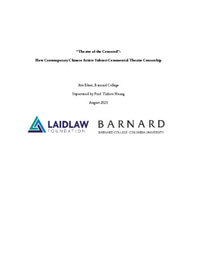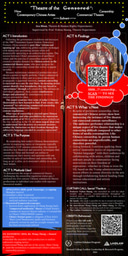“Theatre of the ‘Absurd’”? How Contemporary Chinese Artists Subvert Censorship
PROJECT BACKGROUND
With authoritarianism globally on the rise, it’s more urgent than ever to understand: how do artists in censored societies combat these limitations through the subversive language encoded in creative expression? My focus will be on contemporary Chinese theatre in the post-Mao era, typically defined by China’s shift towards economic reform, an embrace of global capitalism, and its presentation as a neoliberal society. Following the government crackdown and massacre of the 1989 Tiananmen Square Democracy Protests, China has established itself as an active hegemon on the world stage whose interests lie in engaging with democratic-presenting nations while simultaneously operating domestically as an authoritarian regime. The tension between this presentation of neoliberal values and the exercise of censorship-control has created a complex dynamic for Chinese artists in the commercial theatre scene.
The need for a “free market” in contemporary China means that in spite of government censorship, there is no overarching set of defined guidelines or rules for theatrical performance because the government does not want to stifle the economic possibilities of a thriving, abundant commercial theatre industry. Depending on the regional government of a performance’s location, the venue, the performance’s perceived scope and its subject matter, content-censorship is exercised on a case-by-case basis. The lack of a “hard line” means there is simultaneous danger and flexibility for contemporary artists to take creative risks. As Professor Huang once said, “The thing about making theatre in China: everyone thinks there’s lots of censorship, but there are so many possibilities [for innovation] because there aren’t as many rules as there are here” with regards to what has been established on Broadway as widely marketable and “palatable” to commercial audiences.
In a recent Barnard Theatre panel hosted by Professor YiZhou Huang, I met Wang Chong, a Chinese director navigating the risk of censorship in his productions. Adapting to those constraints pushed Wang to innovate storytelling methods that still conveyed his socio-political criticism to Chinese and international audiences. I hope to understand how artists like Wang continue to create political work within China that endures despite content-restriction and government regulation—and how such artists even use those restrictions to innovate and spearhead more inventive, provocative forms of storytelling. The takeaways from such findings provide hope for us all, because art is the tool we can use to express our beliefs in spite of oppression or censorship. As long as art is alive, so is our ability to express our beliefs—no matter what form that may take.
OBJECTIVE/RESEARCH QUESTION(s)
-
Main Question: How have China’s experimental (avant-garde/postdramatic/social) theatre artists developed techniques for subverting CCP content-based censorship since China’s Post-Mao shift?
- How does China’s content-censorship influence its people’s artistic expression?
- Are there consistent themes one can observe about the traits of contemporary Chinese theatre and its evolution alongside the government’s increasing censorship?
METHODOLOGY
My primary research structure will be to conduct analysis of experimental theatre techniques/ “innovations” used to bypass/evade censorship from one or two production recordings of shows by experimental contemporary Chinese directors. To conduct this analysis, I’ll recruit the following additional methodologies:
- Literature review
- To analyze how artists have innovated chinese theatre in the contemporary moment, I’ll look at existing scholarly analyses of experimental theatre productions in the Post-Mao era to contextualize specific characteristics of those shows that have made them "subversive"
-
- Performance analysis
-
-
- Through collecting research on experimental avant-garde artists in China, I am compiling a list of characteristics that seem to contribute to a production’s successful longevity and subversion of content-censorship, in spite of its socio-political commentary. I plan on selecting one or two production videos of performances by contemporary theatre directors in China (perhaps Mou Sen and Wang Chong) to do my own analysis of their staging and design choices to identify the underlying political elements of the production and why it was able to bypass the censors.
- I plan on using my literature review of existing scholars an theorists as a guiding lens to inform my findings.
-
Interviews
- I anticipate interviewing journalists with experience covering Chinese censorship, performance scholars, and artists who actively create work based in China, as well as those whose work has been subjected to censorship measures. These interviews will help me understand contemporary theatre makers' thought processes in design and staging choices within the context of navigating China’s content-censorship. Learning how intentionally-designed each aspect of the performance and staging is in relation to an awareness of censorship risks and boundaries will inform my research on how those limitations have directly influenced creative or unconventional choices onstage.
-
IMPACT & SIGNIFICANCE
By understanding how censorship influences Chinese theatre, my research will heighten critical awareness during media consumption, encouraging Chinese viewers to consider the intended influence of media messaging. The insights from this analysis could be especially important in the US, where, under the new Trump administration, government websites and art institutions are being forced to censor inclusive language under the administration’s efforts to restrict diversity. Under Trump’s administration, censorship is emerging in the US through the gradual erasure of DEI programs and other initiatives that protect access to marginalized stories, peoples and perspectives. As I observe trends of eroding democracy in the US, mirroring the authoritarian censorship I’m studying for this “Summer One” research, it’s essential I learn from artist-activists who continue to creatively bypass the limitations imposed upon their free expression and identity. Most importantly, understanding how artists continue to thrive under restriction—or, like the avant-garde director Wang Chong, use those restrictions to revolutionize storytelling—provides a foundation for protecting the right to freely communicate the truth.



Please sign in
If you are a registered user on Laidlaw Scholars Network, please sign in